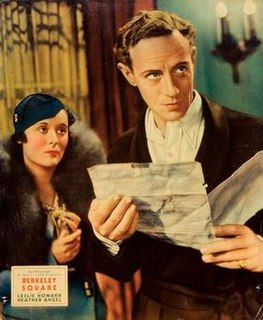This page is based on this
Wikipedia article Text is available under the
CC BY-SA 4.0 license; additional terms may apply.
Images, videos and audio are available under their respective licenses.

Ronald Howard was an English actor and writer best known in the U.S. for starring in a weekly Sherlock Holmes television series in 1954. He was the son of actor Leslie Howard.

The Letter is a 1940 American film noir directed by William Wyler, and starring Bette Davis, Herbert Marshall and James Stephenson. The screenplay by Howard E. Koch is based on the 1927 play of the same name by W. Somerset Maugham. The play was first filmed in 1929, by director Jean de Limur.

Berkeley Square is a 1933 American pre-Code fantasy drama film produced by Fox Film Corporation, directed by Frank Lloyd, and starring Leslie Howard and Heather Angel. It recounts the tale of young American Peter Standish, played by Howard, who is transported back to London shortly after the American Revolution, where he meets his ancestors. The film was based on the play of the same name by John L. Balderston, itself loosely based on the incomplete novel The Sense of the Past by Henry James. Howard also played Standish in the Broadway play.

The Fantasy on Themes from Mozart's Figaro and Don Giovanni, S.697, is an operatic paraphrase for solo piano by Franz Liszt, left as an unfinished manuscript upon his death, but completed by the pianist Leslie Howard and published in 1997. It has also been referred to as the "Figaro/Don Giovanni Fantasy" and is based on music from Mozart's operas The Marriage of Figaro and Don Giovanni. Liszt composed the work by the end of 1842 or early 1843, as he performed it at the latest in Berlin on 11 January 1843.

Leslie West is an American rock guitarist, vocalist, and songwriter. He is best known as a founding member of the hard rock band Mountain.
Leslie Howard (Les) Saunders was Mayor of Toronto, Canada, from 1954 to 1955 and the last member of the Orange Order to hold the position until William Dennison. He also served as Mayor of East York in 1976.

Intermezzo (1939) is a romantic film made in the US by Selznick International Pictures and nominated for two Academy Awards. It was directed by Gregory Ratoff and produced by David O. Selznick. It is a remake of the Swedish film Intermezzo (1936) and features multiple orchestrations of the Heinz Provost's piece of the same name, which won a contest associated with the original film's production. The screenplay by George O'Neil was based on the screenplay of the original film by Gösta Stevens and Gustaf Molander. The scoring by Lou Forbes was nominated for an Academy Award, and music credit was given to Robert Russell Bennett, Max Steiner, Heinz Provost, and Christian Sinding. The cinematography by Gregg Toland who replaced Harry Stradling was also nominated for an Academy Award.
Valse-Impromptu, S.213, is a waltz for solo piano composed by Franz Liszt in the key of A-flat major.
Arliss Howard is an American actor, writer and film director.

BOAC Flight 777-A was a scheduled British Overseas Airways Corporation civilian airline flight from Portela Airport in Lisbon, Portugal to Whitchurch Airport near Bristol, England. On 1 June 1943, the Douglas DC-3 serving the flight was attacked by eight German Junkers Ju 88 fighter planes and crashed into the Bay of Biscay, killing all 17 on board. There were several notable passengers, among them actor Leslie Howard.

Jimmie Olden Johnson Jr. is a former American football tight end and current coach. Johnson played college football at Howard University and professionally in the National Football League (NFL) from 1989 to 1998. He is a member of Omega Psi Phi fraternity.
Leslie Howard Kelley is a former American football fullback/linebacker in the National Football League for the New Orleans Saints. He played college football at Alabama and played just 3 seasons in the NFL without ever starting.
Wilfred Noy was an English film director, actor, screenwriter and producer of the silent era. Noy was the maternal uncle of Leslie Howard. He directed 89 films between 1910 and 1936. He also appeared in 18 films between 1924 and 1939.
The Mephisto Polka is a piece of program music written in folk-dance style for solo piano by Franz Liszt in 1882–83. The work's program is the same as that of the same composer's four Mephisto Waltzes, written respectively in 1859–60, 1880–81, 1882 and 1885 and based on the legend of Faust, not by Goethe but by Nikolaus Lenau (1802–50). The following program note, which Liszt took from Lenau, appears in the printed score of the Mephisto Waltz No. 1:
There is a wedding feast in progress in the village inn, with music, dancing, carousing. Mephistopheles and Faust pass by, and Mephistopheles induces Faust to enter and take part in the festivities. Mephistopheles snatches the fiddle from the hands of a lethargic fiddler and draws from it indescribably seductive and intoxicating strains. The amorous Faust whirls about with a full-blooded village beauty in a wild dance; they waltz in mad abandon out of the room, into the open, away into the woods. The sounds of the fiddle grow softer and softer, and the nightengale warbles his love-laden song.
Five and Ten is a 1931 American pre-Code romantic drama film starring Marion Davies as an heiress and Leslie Howard as the man she loves, though he marries someone else. It is based on the Fannie Hurst novel of the same name.
Leslie is a surname and given name, derived from the name of Clan Leslie.
The name derives from a placename in Aberdeenshire, perhaps an anglicisation of an originally Gaelic leas celyn "holly-garden". In the United Kingdom, the name is spelled Leslie when given to boys, while for girls it is usually rendered as Lesley.
The Heroine of Mons is a 1914 British silent war film directed by Wilfred Noy and starring Dorothy Bellew, Leslie Howard and Bert Wynne. The film marked the screen debut of Howard, who went on to be leading star of British and Hollywood cinema. The film was made during the opening weeks of the First World War, and refers to the Battle of Mons.









